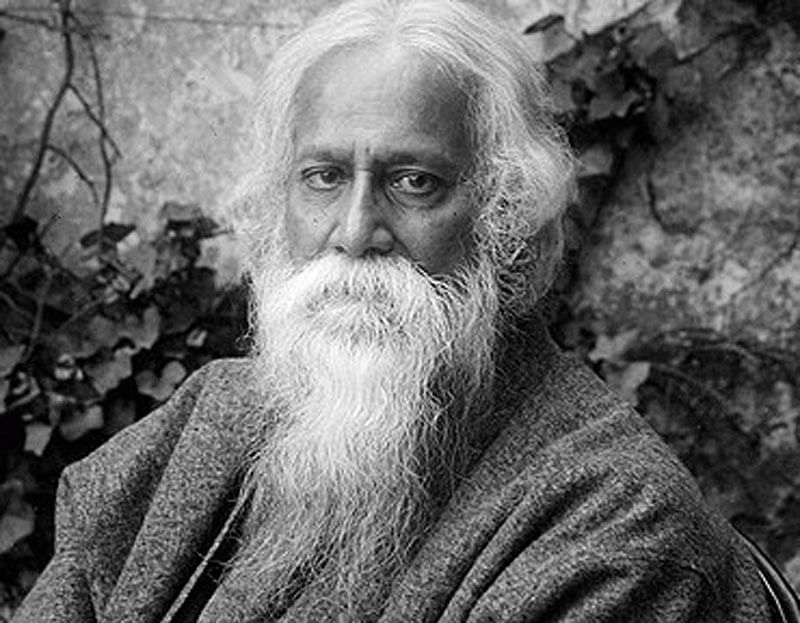
The country is celebrating today the 157th birth anniversary of Rabindranath Tagore, fondly known as 'Gurudev'.
The youngest son among 13 children, he lost his mother at a young age. Since his father was a traveller, he was raised by the servants of his house. His father was a leader of the Brahmo Samaj, which was a new religious sect in 19th century Bengal.
Tagore started writing poems at the tender age of 8. He also started composing artworks at the time and publishing poems by the time he was 16. He was educated at home and although at 17, he was sent to England for formal schooling, he did not finish his studies there.
Tagore had early success as a writer in his native Bengal. A poet, short-story writer, song composer, playwright, essayist and painter, he introduced new prose and verse forms and the use of colloquial language in Bengali literature. He thereby freed it from traditional models based on classical Sanskrit.
In 1911, Tagore wrote the lyrics and composed music for the Indian National Anthem 'Jana Gana Mana'. In 1913, he became the first non-European to receive the Nobel Prize for Literature for his collection of poems called 'Gitanjali'. In his mature years, in addition to his many-sided literary activities, he managed the family estates, a project which brought him in close touch with common humanity and increased his interest in social reforms.
He also started an experimental school at Shantiniketan where he tried his Upanishadic ideals of education. During the initial stage of his career, his stories reflected the surroundings in which he grew. He also made sure to incorporate social issues and problems of the poor man in his stories.
Tagore also wrote about the downside of Hindu marriages and several other customs that were part of the country’s tradition back then. Some of his famous short stories include ‘Kabuliwala’, ‘Kshudita Pashan’, ‘Atottju’, ‘Haimanti’ and ‘Musalmanir Golpo’ among others.
His works spoke about the forthcoming dangers of nationalism among other relevant social evils. His novel ‘Shesher Kobita’ narrated its story through poems and rhythmic passages of the main protagonist.
Tagore drew inspiration from ancient poets like Kabir and Ramprasad Sen and thus his poetry is often compared to the 15th and 16th-century works of classical poets. In 1915, he received a knighthood from the British Crown, which he rejected quoting the massacre held at Jallianwala Bagh. He said that the knighthood meant nothing to him when the British failed to even consider his fellow Indians as humans. In 1937, he went into a comatose condition, which deteriorated after a period of three years. After an extended period of suffering,
Tagore died on August 7, 1941, in the same Jorasanko mansion where he was brought up.
A Timeline of Tagore's Life
May 7, 1861: Born in the Jorasanko House of the Tagore family in Kolkata. He was the 13th child of Debendranath Tagore and Sarada Devi.
December 9, 1883: Married Mrinalini Devi, who was aged ten then.
December 22, 1901: Established a school in Shantiniketan with his father’s consent and blessings. He built the school on the model of ancient forest schools of India (Tapovan) but gave it an open and scientific outlook later.
August 14, 1910: Published Gitanjali, a collection of poems in Bengali. It was later translated to English and published as Gitanjali- Song offerings in 1912. The manuscript was edited by WB Yeats and Rothenstein.
December 27, 1911: Jana-Gana-Mana, originally composed by Tagore, was sung in the Calcutta Conference of the Indian National Congress. It was further adopted by the Constituent Assembly as the National Anthem in 1950
November 13, 1913: The universal appeal of Gitanjali gave the collection a musical approach and hence awarded the Nobel Prize for Literature.
June 3, 1915: Knighted by Lord Hardinge.
December 22, 1918: He inaugurated Visva-Bharati as a centre of Indian culture, a seminary for Eastern studies and a meeting place for East and the West. The motto, for it was selected from an ancient Sanskrit verse - ‘Where the whole world meets in one nest.’
April 13, 1919: He renounced his Knighthood as a protest against the inhuman act of the British government against the unarmed people at Jallianwala Bagh in Amritsar.
April 3, 1920: Tagore met Gandhi in Ahmedabad, on his invitation to the 6th Conference on Literature, after a continuous exchange of letters and Gandhi’s stay in Shantiniketan.
August 7, 1941: Tagore died at the age of 80
